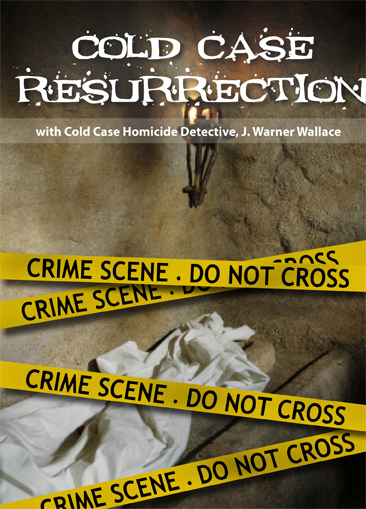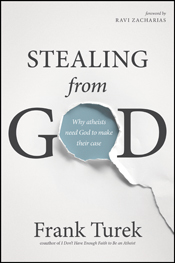Why are you a Christian? As a full-time church youth pastor and a part-time adjunct professor at a Christian college, I like to ask this question to all of my students. In fact, I ask this question quite often to many active churchgoers these days. The answer I typically receive in response to my simple question is nothing but a blank stare. After a little coaxing, sometimes I get answers like, “because my parents were Christians,” or, “’cause I was born in ‘Merica!” With that I respond, “Oh, so if you were born in Afghanistan, then you would be a Muslim?” The blank stare typically returns.
What frightens me about the state of the church (including many pastors) today is that by and large, we do not know WHY we are Christians. I think that if pressed, many churchgoers today simply like the story of the gospel, but they don’t really think it’s true! Perhaps they like the “country club atmosphere” the church provides and the community they can find there, but they sure don’t think Christianity is really true!
This is evidenced by so many unchanged lives. We see this play out every week when we see churchgoers in the pews on Sunday mornings, singing praise songs, opening their Bibles, and whispering “amen” to the pastor’s message, but during the week you couldn’t tell a difference between the churchgoer and the atheist. In fact, it doesn’t surprise me to see the atheist living a more moral life than the churchgoer on Friday and Saturday nights. But as soon as Sunday morning comes around, they will put on their Sunday best and come back to the good ol’ country club (I mean church).
Speaking of atheists, it is these hypocritical churchgoers who are the greatest cause of atheism in the world today. Why do we find this dilemma in the modern church? Because people don’t think Christianity is really true! Sure, if you ask them they will tell you that they think it’s true, but deep down, they have been influenced by atheistic naturalism if they realize it or not. They really don’t think any of this supernatural stuff is true at all.
As a pastor, I believe the problem starts at the pulpit. When pastors themselves don’t really know why they believe what they say they believe, the people in the pews hear it loud and clear. The congregation will at least have caught what was not intentionally meant to be taught. Many times pastors will say things like, “According to the Bible, Jesus was raised in Nazareth,” or “The Biblical truth is that Jesus was raised in Nazareth.” While these statements are true (and the intention is good), statements worded in this manner can often lead to postmodern views. People will have caught what was not meant to be taught. They will think, “Oh, there is Biblical truth, and there is also Islamic truth, there is Buddhist truth, and there is Star Wars truth. So you can have your Biblical truth, and I’ll have my Star Wars truth!”
Here’s the problem: Is it true that Luke Skywalker was raised on the planet Tatooine? Yes, that is a true statement. Within the Star Wars narrative, Luke Skywalker was raised on the planet Tatooine. Next question: Is it true that Jesus was raised in Nazareth? Yes, that is a true statement. Within the Biblical narrative, Jesus was raised in Nazareth. Both of these propositions are true within their narratives, but only one of these statements corresponds to reality. That is to say, only one of these statements is really true!
By definition, statements that are true correspond to reality. Reality is the way things are. If churchgoers simply attend on Sunday mornings because the Gospel story makes them feel good, or merely because they like the people in their small group, you will never see a radical transformation in their lives. This kind of transformation only occurs when one comes to understand Ultimate Reality (God)! Moreover, even if one kept all of the church’s/country club’s “rules,” and acted like Mother Theresa, but didn’t really think Christian theism was true, then, these individuals are not Christians.
Saving belief requires three essential components that can be remembered via the acronym, “K.A.T.” Let’s apply this to John 14:6 (one of my favorite Bible verses). In this verse, Jesus is quoted as saying, “I am the way, and the truth, and the life. No one comes to the Father except through me.” The “K” stands for knowledge. This means, understanding the proposition that Jesus is the only way to the Father. The “A” stands for assent. This means, believing this proposition is really true. If you don’t really think it’s probably true, then you do not have saving belief.
It’s important to note that merely having the “K” and the “A” of K.A.T. is not enough for salvation as James 2:19 states that even “the demons believe and shudder.” One must possess knowledge and assent, but then they need the “T” to complete saving belief: trust! Have you put your trust (a.k.a. “faith”) in what you believe is probably true? If not, you have the same kind of belief the demons have. Let that sink in a bit!
There are many churchgoers today that only have the first two aspects of saving belief as they understand the Gospel and think it’s probably true; however, they have never put their trust/faith in Christ. With that said, I am starting to see that many today (including some pastors) at least struggle with the “A.” They do not really think Christianity is true. They might really like the story, and they can tell you what the Bible says, but they don’t really think it corresponds to reality.
Now, I’ve devoted my life to truth. In fact, I would say that I am more committed to truth that I am to Christianity. However, since I am devoted to truth, and I am fully convinced that Christianity is really true, I am willing to die for my faith! If I’m willing to die for my faith, you better believe I’m willing to live it out 24/7!
When churchgoers know what they believe, and why they believe it, radical transformation occurs (Romans 12:2)! When the churchgoer is transformed into someone who understands reality and knows that Christianity is true, the “compartmentalized” problems of the modern church come to an abrupt end. That is to say, churchgoers will do so much more than only act like a Christian on Sunday mornings and maybe Wednesday nights; rather, they will live for Jesus Christ all the time, even when no one else is watching!
I am committed to truth, and since I sincerely believe the Bible is true in all that it teaches, I think we should read it to see what Jesus thought about “truth.”
John 4:24
“God is spirit, and those who worship him must worship in spirit and truth.”
John 8:31-32
“… If you abide in my word, you are truly my disciples, and you will know the truth, and the truth will set you free.”
John 14:6
“Jesus said to him, “I am the way, and the truth, and the life. No one comes to the Father except through me.”
John 18:37
“… For this purpose I was born and for this purpose I have come into the world—to bear witness to the truth. Everyone who is of the truth listens to my voice.”
Wow! The very reason the creator of the universe entered into the universe was to testify to the TRUTH! If Jesus has this attitude towards truth, I see nothing wrong with being devoted to truth our selves. In fact, if we are truly Christ followers, we ought to be committed to the same thing. If there is any confusion regarding Jesus’ attitude towards truth, Paul makes it clear:
Ephesians 4:15
Rather, speaking the truth in love, we are to grow up in every way into him who is the head, into Christ,
Ephesians 4:25
Therefore, having put away falsehood, let each one of you speak the truth with his neighbor, for we are members one of another.
Philippians 4:8
“Whatever is true…. think about these things.”
1 Timothy 2:4
(God) “desires all people to be saved and to come to the knowledge of the truth.”
Let’s get back to the original question. I hope if someone inquires and asks, “Why are you a Christian?,” you can respond with more than just a blank stare. When someone asks me that simple question I respond with a simple answer:
“I’m a Christian because I believe it’s TRUE!”
Christianity is so much more than simply being true according to the narrative found in a book. The gospel message found in the Bible also corresponds to reality. That is to say, Christianity is really true!
Stay reasonable my friends (Philippians 4:5),
Tim Stratton
Visit Tim’s Site: Free Thinking Ministries
Visit the source site of this article.
Resources for Greater Impact:



 http://bit.ly/2aKOC9b
http://bit.ly/2aKOC9b http://bit.ly/SFG_Book
http://bit.ly/SFG_Book













Facebook Comments